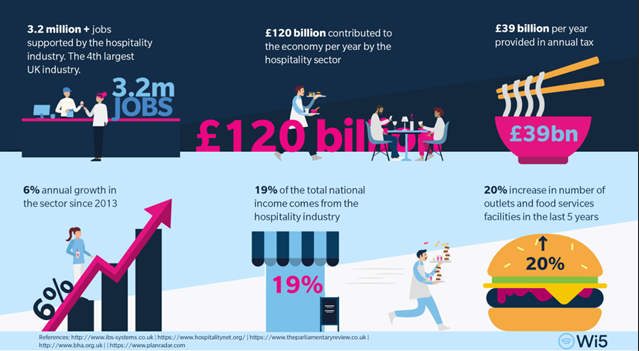I hope this finds you well and looking forward to more time with friends and family as lockdown rules continue to ease.
It definitely feels like British life is beginning to return to some semblance of normality. Restaurants and pubs are beginning to reopen, tickets for music festivals and shows are back on sale, whilst international travel is finally back on the agenda. After everything we’ve been through, I think it’s safe to say we could all use a summer holiday, or at least an al fresco lunch.
Not only is this an extremely welcome development for a nation of Brits frustrated by over a year of restricted freedoms, but also for the embattled hospitality sector, which has perhaps been the most gravely affected by Covid-19 and lockdown restrictions…I hope this finds you well and looking forward to more time with friends and family as lockdown rules continue to ease.
It definitely feels like British life is beginning to return to some semblance of normality. Restaurants and pubs are beginning to reopen, tickets for music festivals and shows are back on sale, whilst international travel is finally back on the agenda. After everything we’ve been through, I think it’s safe to say we could all use a summer holiday, or at least an al fresco lunch.
Not only is this an extremely welcome development for a nation of Brits frustrated by over a year of restricted freedoms, but also for the embattled hospitality sector, which has perhaps been the most gravely affected by Covid-19 and lockdown restrictions…
The hospitality sector is a huge part of the UK economy. Heading into our first lockdown early in 2020, it was prosperous and growing. Hospitality contributed a staggering £120bn to the economy, accounting for nearly 20% of the total national income, whilst employing 3.2m workers, which amounted to 9% of all jobs in the UK.
To put that in perspective, that’s a larger workforce than the whole of the motor, manufacturing, transport and financial services sectors combined.
Whilst it’s close relation the travel industry was also badly hit, at least the aviation companies were able to repurpose some of their planes for other uses, with many being converted into cargo carriers, commercial transporters and some even seeing use fighting fires, bombarding wildfires with fire retardants and water.
Because of the way lockdown measures were enforced and the nature of the business, the hospitality sector didn’t have the same ability to adapt. With 99% of businesses making up the sector taking the form of SMEs (‘small to medium enterprise’), most lacked the deep pockets and capital reserves of the larger businesses that dominate other sectors of the economy, that were better able to weather the storm. This has sadly led the collapse of many beloved bars, restaurants and coffee houses around the country. Even at the base of our building, two regular haunts of team Wetherall’s - the Grill on New York Street and Department of Coffee - have both sadly succumbed and closed their doors for good.
However, with lockdown measures finally unlocking, hopes are rising for a hospitality sector recovery.
Last week Kate and I were delighted to be able to eat out for the first time since the last lockdown began. After being restricted from dining out for so long, it’s safe to say our excitement got the better of us. After savouring the glorious taste of my first post-lockdown pint, we ended up ordering a frankly ridiculous amount of food, resulting in a drive home huffing, puffing and groaning in discomfort (though it didn’t stop us taking a trio of desserts to go).
By the time we were home and the food-haze had passed, it dawned on me that our gluttonous behaviour was actually a pretty accurate analogy for the potential recovery of the hospitality sector at large post-Covid.
Pent up demand for socialising in pubs, eating out and weekend getaways is now beginning to be unleashed, with Brits across the country eager to (over)spend in restaurants, bars and hotel stays, with many city restaurants already fully booked for months in advance. This rapacious demand, combined with millions of households sitting on ‘accidental savings’, means that the public are well financed to help fuel the hospitality sector resurgence.
With signs of hospitality blossoming back into life, it will be interesting to see what the numbers tell us as the economic data begins to flow. As Brits return in earnest to enjoying life’s little luxuries, let’s hope for a brisk recovery for the sector, so hospitality workers get back to gainful employment, whilst operators rebuild their balance sheets and reinvigorate their businesses.





